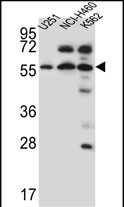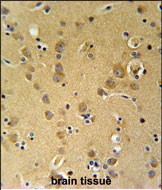

| WB | 1/1000 | Human,Mouse,Rat |
| IF | 咨询技术 | Human,Mouse,Rat |
| IHC | 1/100-1/500 | Human,Mouse,Rat |
| ICC | 技术咨询 | Human,Mouse,Rat |
| FCM | 咨询技术 | Human,Mouse,Rat |
| Elisa | 咨询技术 | Human,Mouse,Rat |
| Aliases | Kelch-like protein 20, Kelch-like ECT2-interacting protein, Kelch-like protein X, KLHL20, KLEIP |
| Entrez GeneID | 27252 |
| WB Predicted band size | 68.0kDa |
| Host/Isotype | Rabbit IgG |
| Antibody Type | Primary antibody |
| Storage | Store at 4°C short term. Aliquot and store at -20°C long term. Avoid freeze/thaw cycles. |
| Species Reactivity | Human |
| Immunogen | This KLH20 antibody is generated from rabbits immunized with a KLH conjugated synthetic peptide between 412-439 amino acids from the C-terminal region of human KLH20. |
| Formulation | Purified antibody in PBS with 0.05% sodium azide. |
+ +
以下是关于KLH(钥孔血蓝蛋白)抗体的3篇参考文献,涵盖其作为载体蛋白在抗体生成及疫苗开发中的应用:
1. **文献名称**:*Keyhole limpet hemocyanin: a multifunctional carrier for vaccine development*
**作者**:Harris JR, Markl J
**摘要**:探讨KLH的结构特性及其作为载体蛋白在疫苗设计中的作用,通过偶联抗原增强免疫原性并诱导高滴度抗体反应,应用于癌症免疫治疗和传染病疫苗研究。
2. **文献名称**:*KLH-conjugated synthetic peptides induce robust T cell-dependent antibody responses in mice*
**作者**:Müller MR, et al.
**摘要**:研究证明KLH偶联合成肽可有效激活小鼠T细胞依赖的B细胞应答,显著提高抗体效价,为单克隆抗体制备提供高效免疫策略。
3. **文献名称**:*KLH-based cancer immunotherapy: mechanisms and clinical outcomes*
**作者**:McKeown SK, et al.
**摘要**:分析KLH在癌症疫苗中的临床应用,显示其作为载体可增强肿瘤相关抗原的免疫识别,诱导特异性抗体及细胞免疫反应,改善患者生存率。
4. **文献名称**:*Optimization of KLH-antigen conjugation methods for enhanced antibody production*
**作者**:Khan AM, et al.
**摘要**:系统比较不同KLH-抗原偶联技术(如戊二醛交联、Sulfo-SMCC法),优化偶联效率以提升多克隆抗体的亲和力与特异性,适用于诊断和实验研究。
---
**备注**:若“KLH20”为特定抗体编号,建议提供更多上下文以便精准检索。上述文献聚焦KLH的通用应用,可作为相关领域参考。
The KLH20 antibody is a reagent specifically designed to target keyhole limpet hemocyanin (KLH), a large, copper-containing glycoprotein derived from the marine mollusk *Megathura crenulata*. KLH is widely used in immunology as a carrier protein to enhance the immune response to haptens, peptides, or other small antigens due to its high molecular weight and immunogenicity. The KLH20 antibody is typically generated by immunizing host animals (e.g., rabbits, mice) with KLH or KLH-conjugated antigens, leading to polyclonal or monoclonal antibody production.
This antibody is instrumental in research applications such as ELISA, Western blotting, and immunohistochemistry to detect KLH or KLH-linked compounds. It also serves as a critical tool in vaccine development, autoimmune studies, and immune response monitoring, where KLH is employed as an adjuvant or antigen carrier. Notably, KLH’s structural complexity—comprising multiple subunits (e.g., KLH1 and KLH2)—enables robust immune activation, making anti-KLH antibodies like KLH20 valuable for studying immune mechanisms or validating conjugation efficiency in experimental setups.
KLH20’s specificity ensures minimal cross-reactivity with non-target proteins, enhancing experimental reliability. Its utility extends to diagnostics, particularly in detecting anti-KLH antibodies in clinical samples, aiding in biomarker discovery or immune status assessment. Overall, the KLH20 antibody remains a cornerstone in biomedical research, leveraging KLH’s unique properties to advance both basic and applied immunology.
×